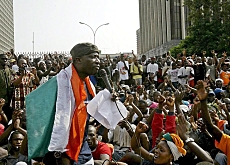Swiss embassy in Ivory Coast reacts to unrest

Switzerland says it is monitoring the situation in Ivory Coast closely after an upsurge in violence but has no plans to evacuate the 150 Swiss nationals living there.
By Friday morning the tense situation in the economic capital, Abidjan, appeared to be easing as the leader of the riots called on his supporters to end their attacks on United Nations and French troops.
UN peacekeepers have come under sustained attack from stone-throwing youth militias since Monday.
A foreign ministry spokeswoman said Switzerland was “concerned” by the return to fighting in the divided country.
Protests by supporters of President Laurent Gbagbo erupted after UN-backed mediators recommended that parliament should be dissolved as its mandate had expired.
At least four protestors were killed when Gbagbo supporters stormed a UN base, forcing peacekeepers to open fire.
Volatile
“The situation in Abidjan is very volatile and our embassy will remain vigilant,” Carine Carey told swissinfo.
UN Secretary-General Kofi Annan said on Thursday the situation was critical and echoed Security Council calls for an immediate end to the rioting.
As the Security Council met to decide whether to impose sanctions on the country, the leader of the rebellion, Charles Blé Goudé, said he had called on his followers to end the anti-UN protests.
“We are calling on the young patriots to lift all the barricades and leave the streets,” Blé Goudé told the French news agency.
Crisis team
There are around 150 Swiss nationals living in Ivory Coast and there are no plans at present to order their evacuation, according to the foreign ministry.
But Carey said the situation was being re-examined on a daily basis and the embassy was in regular contact with Swiss expatriates.
“The embassy has set up a crisis team to monitor the situation. It has also put security measures in place, and the Swiss community are aware of these,” she said.
Switzerland acted to improve its management of crisis situations in April last year, partly as a result of dissatisfaction over the way it had responded to an uprising in Ivory Coast at the end of 2004.
The embassy in Abidjan was accused of not giving enough information or advice to expatriates.
swissinfo with agencies
Ivory Coast timeline:
September 2002 – Coup attempt against President Laurent Gbagbo fails. Rebels seize the north.
May 2003 – Armed forces and rebel groups sign a ceasefire.
November 2004 – Government air strike on rebel positions kills nine French peacekeepers and one American. French forces respond by attacking the Ivorian air force. Violent anti-French protests force thousands of foreigners to flee.
October 2005 – The United Nations extends President Gbagbo’s mandate by 12 months, postponing elections.
January 2006 – UN-backed mediators recommend parliament be dissolved, prompting violent anti-UN protests.

In compliance with the JTI standards
More: SWI swissinfo.ch certified by the Journalism Trust Initiative


You can find an overview of ongoing debates with our journalists here. Please join us!
If you want to start a conversation about a topic raised in this article or want to report factual errors, email us at english@swissinfo.ch.